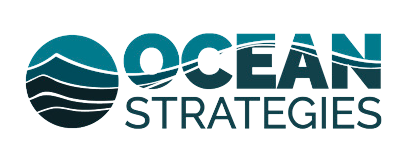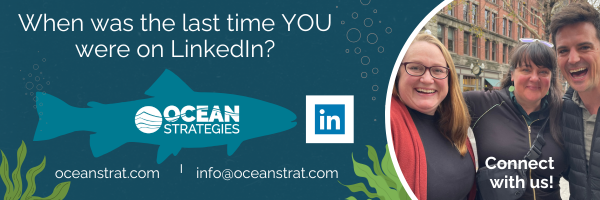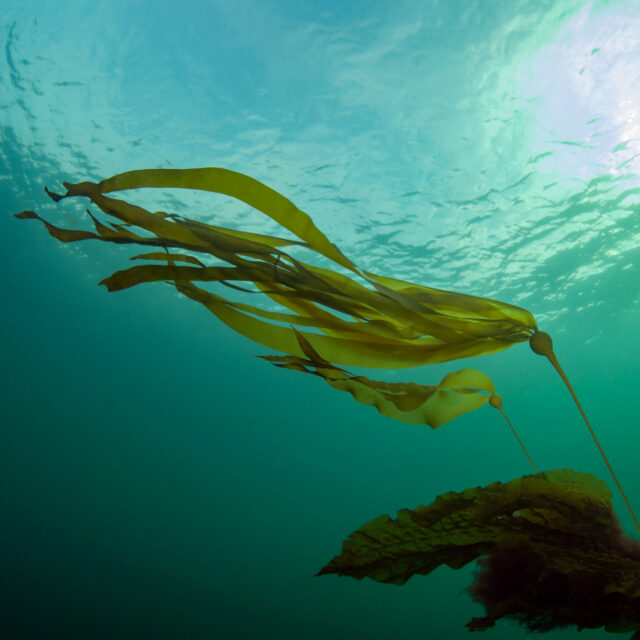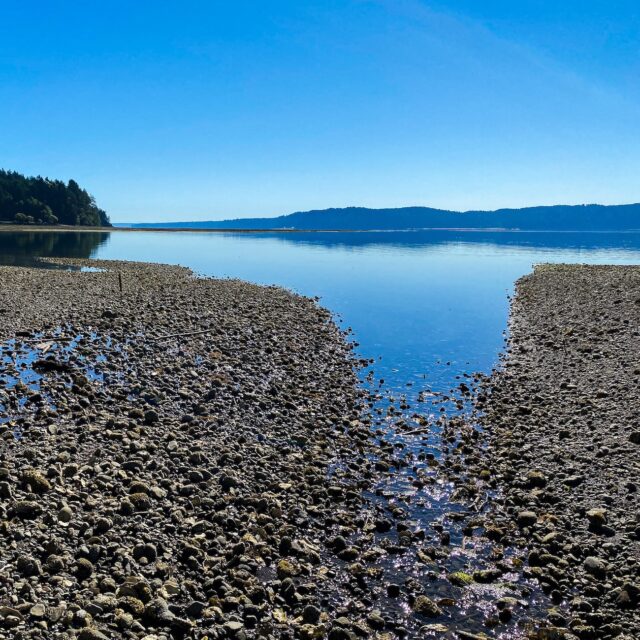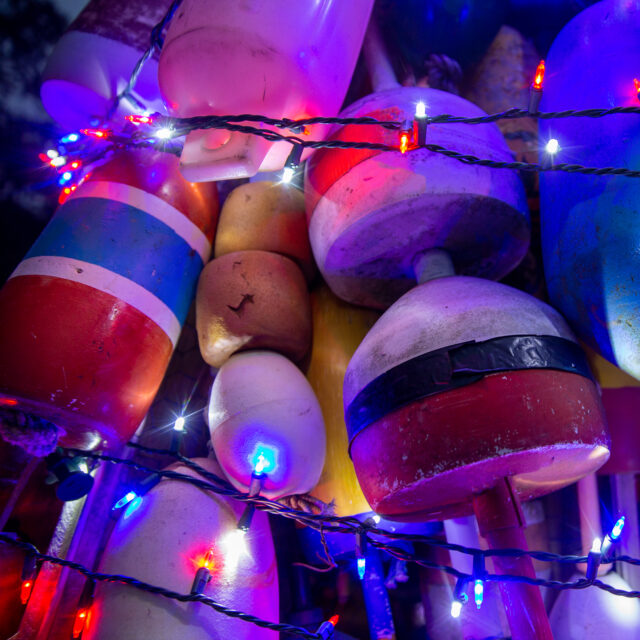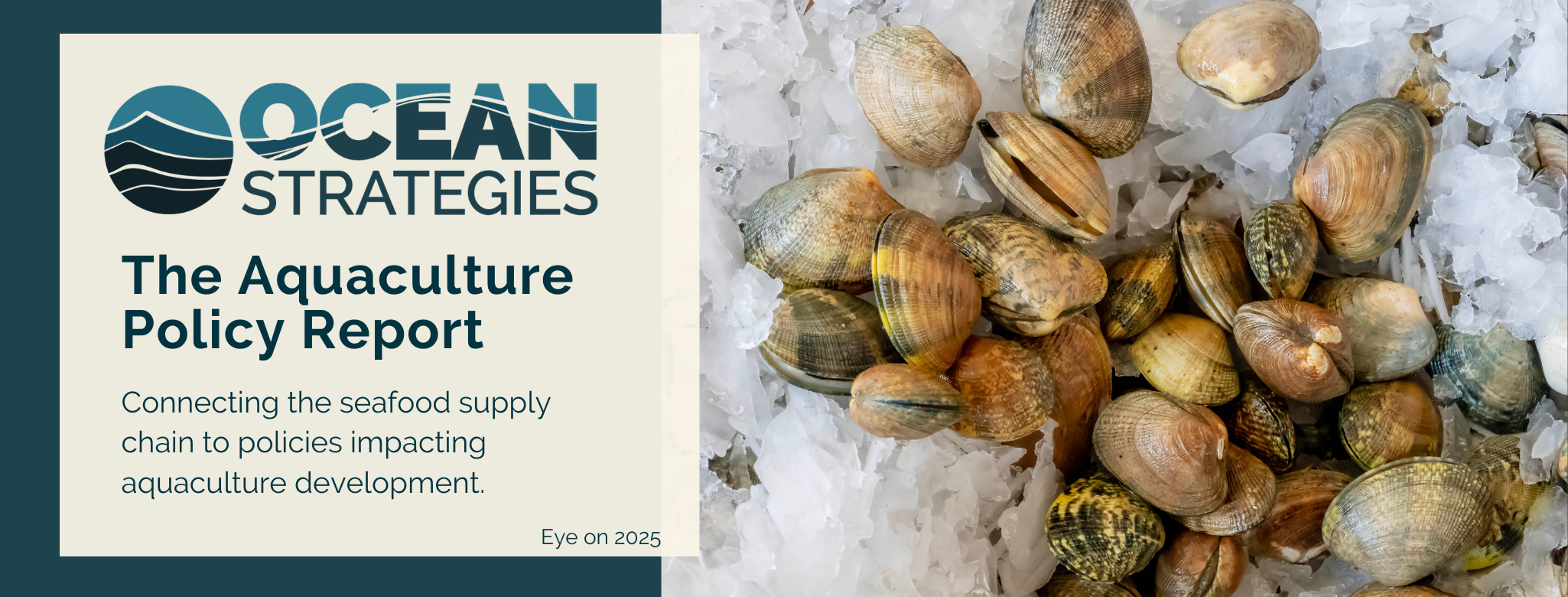
Ocean Strategies is a public affairs firm specializing in seafood, fisheries and marine resources.
This report provides timely policy and industry updates for those connecting sectors across the seafood supply chain to aquaculture policy development. Sign up here.
Included In The Report
- Comments Open for AOAs
- Aquaculture Federal Policy Updates
- Aquaculture Spotlights Coast to Coast
- Washington
- Alaska
- California
- New England
- Gulf of Mexico
- Great Lakes
- Events & Opportunities
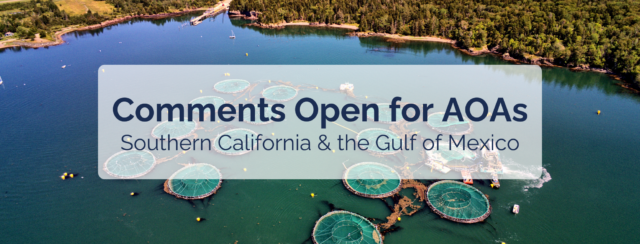
NOAA’s Office of Aquaculture is closing out the year with two 90-day open comment periods for Aquaculture Opportunity Areas in Southern California and the Gulf of Mexico. And coming right on the heels of these (in 2025) is a pending comment period on spatial mapping in the Alaska AOA process.
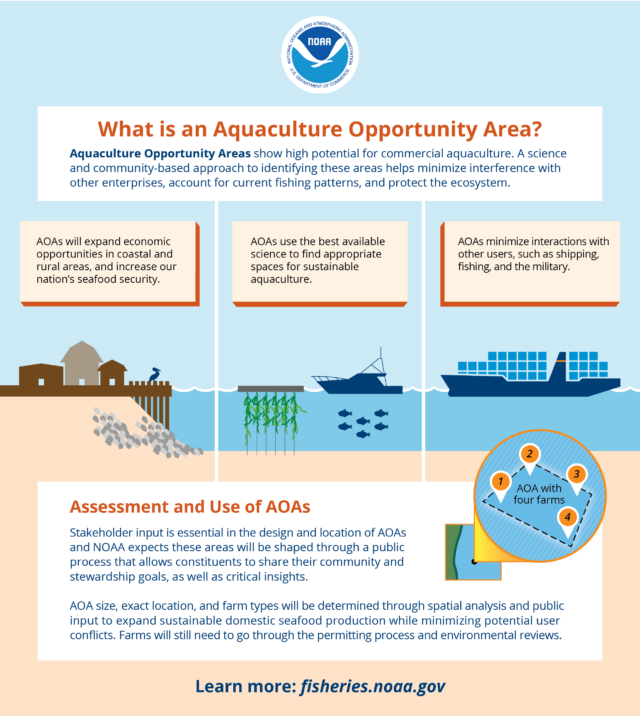
Released in mid-November this year, the comment periods for the draft Programmatic Environmental Impact Statements for Southern California and the Gulf of Mexico are 90 days long, closing on Feb. 20, 2025.
Comments which may be submitted electronically, by mail, or via a sanctioned virtual public meeting hosted.
One of the most important aspects of our work in this arena is helping to educate working waterfront community stakeholders on the processes, opportunities to comment, and helpful details on key comment areas.
Keep an eye out for an upcoming Special Report from Team OS that will summarize the critical components of the AOA Programmatic Environmental Impact Statements for these two regions, as well as opportunities to comment.
Our team is also closely following port proposals in San Diego for seaweed and shellfish permitting opportunities, as well as developments in Maine and Washington state, and federal legislation that affects working waterfronts.
Why do we report on aqua projects when we’re a comfish-founded organization? We believe that community-supported and localized shellfish and seaweed production helps support and strengthen working waterfront infrastructure and access. It also bolsters local seafood markets, career opportunities and regional food systems.
It’s fair to say that the uncertainties of government staffing for agencies under the next Trump administration leave many open questions about the next steps for NOAA. What we can do for now is ensure that key stakeholders provide comments for these existing and developing programs that support shoreside resilience, infrastructure investment, career growth opportunities and sustained public access to marine resources.
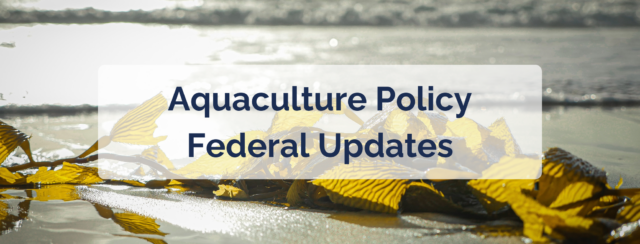
The status of the Farm Bill remains a hot topic on the Hill — now in a lame-duck session between the election and inauguration.
Hope springs eternal for aid to commercial fishing communities. (See our Special Report on the Senate Republican markup for the Farm Bill that included a laundry list of requests from the fishing industry.)
Similar to the Magnuson-Stevens Act (which is ideally reauthorized at least every decade and is currently operating from its last reauthorization in 2006) the Farm Bill is supposed to be reauthorized on a five-year cycle. However, the current iteration of the bill was last overhauled in 2018 and since then has been punted to future congressional cycles without significant changes. The question remains as to whether Congress will extend the legislation with another one-year extension, carrying it to the fall of 2025 and allowing yet more time for negotiations to potentially for new additions that could include seafood industry requests for inclusion — both aquaculture and fisheries.
Integrating seafood into national efforts to support our domestic food systems could create a much-needed shift — both in public perception and in funding opportunities. At Pacific Marine Expo this year, a panel discussion on fisheries and seafood inclusions in the Farm Bill highlighted University of Maine Professor Josh Stoll’s research into USDA grants over the last six years.
“In any given year, the USDA distributes around $31 billion in grants,” said Stoll who also co-founded Local Catch Network. “Seafood-related grants make up only 0.5 percent of the total. Of that, 80 percent goes to aquaculture.”
That small fraction is more likely a result of the seafood industry’s lack of connection to USDA practices and policies, rather than a lack of agency interest in funding seafood projects. Andrea Tomlinson, who founded the New England Young Fishermen’s Alliance, was able to get a USDA grant with help from Local Catch Network.
“We worked with USDA case managers who were very clear, ‘We have the money. Let us teach you how to get it,’” Tomlinson said. “The key is to translate your fisheries language into USDA language.”
Linda Behnken, executive director of the Alaska Longline Fishermen’s Association, used USDA grant funding to build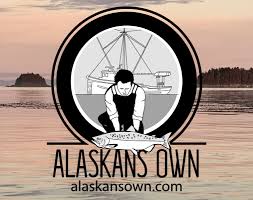 Alaskans Own, a community-supported fishery that connects local consumers with local and sustainably caught seafood.
Alaskans Own, a community-supported fishery that connects local consumers with local and sustainably caught seafood.
“With the support of this grant, we’ve provided 650,000 seafood meals across Alaska,” Behnken said. “We’re building a system that keeps Alaska seafood in Alaska and addresses the growing demand for local food.”
While success stories like those of Tomlinson and Behnken offer new slivers of hope for funding community-based seafood projects and systems, the lift required to establish these programs is just the beginning.
“Grants like these have helped us make great strides, but it will take more to create a lasting, sustainable system,” Behnken said.
In other USDA news, the results from the 2023 Census of Aquaculture is slated for release by mid-December. Follow us on LinkedIn for updates, or visit the agency’s census page.
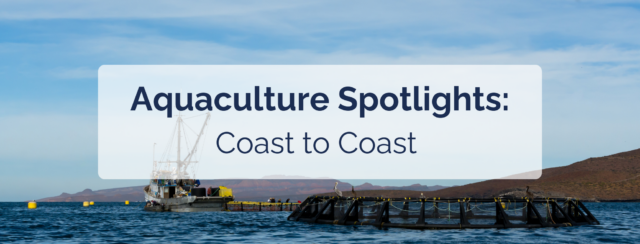
Washington
NOAA announces Nearshore Calculator in Puget Sound. The calculator is designed to provide options for preventing and offsetting the loss of critical nearshore habitat in Puget Sound.
WA Dept of Ecology begins Shoreline Management Act Rulemaking Process. Learn about the process and how you can get involved.
If you follow aquaculture and working waterfront news in the Pacific Northwest, you may consider signing up for our seasonal WA Aqua Bites newsletter.
Alaska
NOAA’s 2024 Alaska Aquaculture Accomplishments Report This year highlights include key achievements in research, sustainability, and community-driven projects for industry growth in Alaska.
Alaskan mariculture: A Lifeline for the Last Frontier A new $49 million grant aims to reinvigorate the Alaskan mariculture scene, prioritizing native and traditionally underserved communities.
California
Ocean Strategies recently sent a Special Report: Deadline for Aqua Program Comments to Port of San Diego to our mailing list. While the public comment period is closed, the formal process continues. Stay tuned for another special report on this valuable process in the new year.
New England
Registration is open for a Connecticut Sea Grant sponsored foundations in shellfish farming course. Financial aid is available; check out the website for more details.
The University of Maine Cooperative Extension 4-H is offering virtual field trips for young learners to explore Maine’s aquaculture industry.
Gulf of Mexico
If you haven’t done so already, create a free account with the Aquaculture Information Exchange and sign up for this Florida Sea grant video series on restoration aquaculture.
Stakeholders please weigh in! NOAA is requesting public input on a draft programmatic environment impact statement supporting the identification of aquaculture opportunity areas in Gulf of Mexico federal waters.
Great Lakes
The National Sea Grant Law Center reviewed the laws of 30 coastal and Great Lakes states to clarify permitted direct seafood sales under commercial fishing and aquaculture permits and examined food establishment licensing. The resulting report, released this Fall, Comparative Analysis of State Approaches to Regulating Direct Seafood Sales provides a basis for identifying best practices and regulatory reform models to support direct seafood sales.
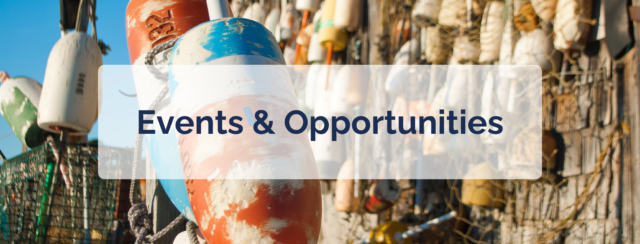
- Job Opportunity! The National Aquaculture Association Executive Director Position is open.
- Don’t miss this Sept 5th virtual event / Women in North America Aquaculture Summit
- February 4-6, 2025 – National Working Waterfront Network Conference, San Diego, Calif.
- February 18-20, 2025 – 4th Annual Mariculture Conference of Alaska, Sitka, Alaska
- March 6-10, 2025 – Aquaculture America 2025, New Orleans, Louisiana
- March 22-26, 2025 – National Shellfisheries Association Annual Meeting, Portland, Ore.
- April 24-27, 2025 – World Aquaculture 2025, Qingdao, China
Here is a list of links to our most recent policy reports. You are always able to find them on our Ocean Pulse Blog. If you’d like to receive them directly, just sign up here.
